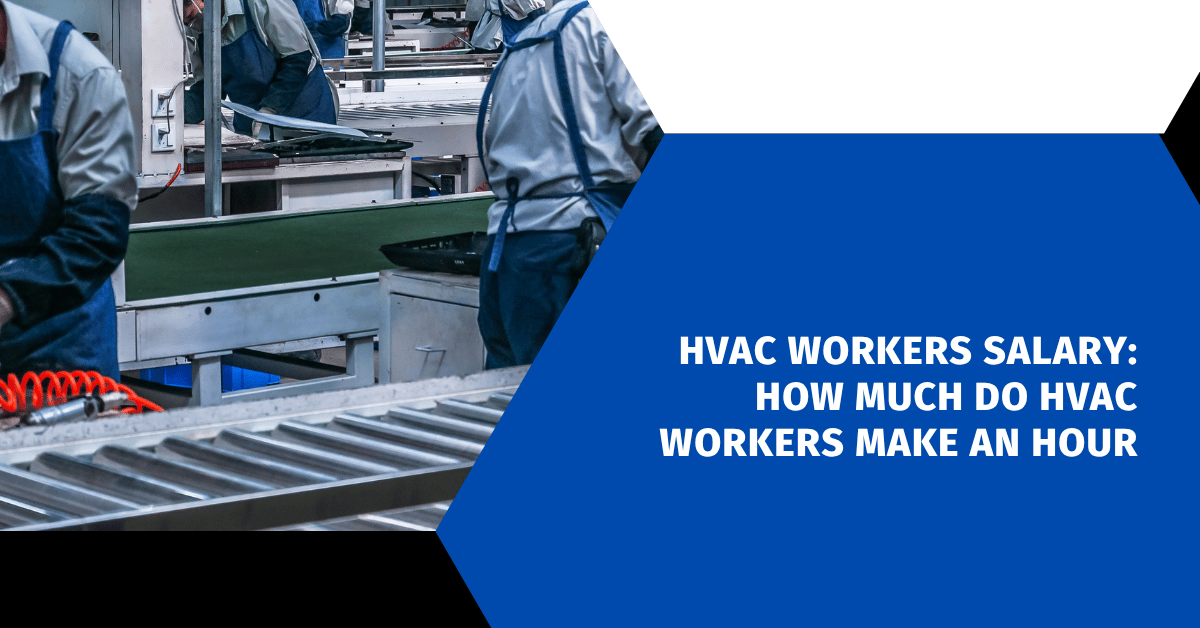Affiliate Disclosure
HVAC Guide Guys is a participant in the Amazon Services LLC Associates Program, an affiliate advertising program designed to provide a means for sites to earn advertising fees by advertising and linking to Amazon.
How Much Do HVAC Workers Make an Hour? Ever thought about why the HVAC industry is so appealing? It’s not just about job security. It’s about knowing how much HVAC workers make today.

The HVAC technician salary scene is full of chances for skilled people. Payscale.com says the average hourly wage is $29.00. Annual earnings can be between $46,000 and $68,000.
Looking into HVAC worker hourly pay, you’ll see a field with big earning possibilities. From starting jobs to advanced technical roles, HVAC jobs pay well. This shows the value of the skills and knowledge needed in this field.
Key Takeaways
- National average HVAC technician hourly wage is $29.00
- Annual salaries range between $46,000 and $68,000
- Compensation varies by experience, location, and specialization
- Technical skills directly impact earning
- HVAC careers offer stable and lucrative opportunities
Table of Contents
Understanding HVAC Worker Compensation Basics
The HVAC industry offers promising career opportunities with competitive compensation structures. Knowing how hvac installer wages are determined can help you navigate your career path and financial expectations.
HVAC professionals’ compensation varies widely based on several factors. Your earning depends on key elements that shape the hourly rate for hvac repair services.
National Average Salary Landscape
HVAC technicians have diverse earning potentials at different career stages. The U.S. Bureau of Labor Statistics shows significant growth in the field, with employment expected to expand through 2033.
| Career Stage | Annual Salary Range | Hourly Rate |
|---|---|---|
| Entry-Level | $35,000 – $45,000 | $17 – $22 |
| Mid-Level | $45,000 – $65,000 | $22 – $32 |
| Experienced | $65,000 – $85,000 | $32 – $42 |
Factors Influencing Base Pay
- Geographic location
- Professional certifications
- Specialization area
- Work experience
- Industry demand
Entry-Level vs Experienced Rates
Your hvac installer wages will increase with experience. Entry-level technicians start around $17-$22 per hour. Experienced professionals can earn $32-$42 hourly rates for hvac repair services.
Continuous learning and skill development are key to maximizing your earning in the HVAC industry.
Explore Our HVAC Shop
Looking for top-rated HVAC tools, parts, and accessories? Visit our shop and find the perfect solution for your needs.
Visit the ShopTop-Paying States for HVAC Technicians
Your pay for HVAC work can change a lot based on where you are in the U.S. Some places pay a lot more for skilled HVAC workers. This makes where you work very important for your earnings.
Looking at how much HVAC workers make in different places shows interesting things. Some states pay a lot more and have strong HVAC job markets.
| State | Average Annual Salary | Key Economic Factors |
|---|---|---|
| California | $68,500 | High cost of living, tech industry demand |
| New Jersey | $65,300 | Dense population, industrial infrastructure |
| Washington | $63,700 | Technology sector growth, climate challenges |
| New York | $62,900 | Urban centers, significant commercial projects |
| Massachusetts | $61,500 | Educational institutions, medical facilities |
What makes these places pay more includes:
- Regional cost of living
- Local economic development
- Climate and seasonal demands
- Urban infrastructure complexity
- Technological innovation requirements
Pro tip: While high-paying states are tempting, think about all the money you’ll make. Look at benefits and living costs too when thinking about moving.
Experience Levels and Corresponding Pay Rates
Your earnings as an HVAC pro grow with experience. Knowing how salaries increase helps you plan your career and financial goals.
How much you earn as an air conditioning technician changes with your experience. The HVAC field offers great financial growth for those who keep learning and gaining experience.
Entry-Level Positions (0-2 years)
At the start of your HVAC career, you’ll earn less but it’s a good starting point. You’ll have:
- Annual salary range: $45,000 – $55,000
- Hourly rates: $22 – $28
- Limited specialized skills
- Focus on learning basic techniques
Mid-Level Careers (2-4 years)
With more experience, your pay goes up. Mid-level technicians handle more tasks and earn more:
- Annual salary range: $60,000 – $70,000
- Hourly rates: $30 – $35
- Advanced technical knowledge
- More customer interaction
Senior Positions (4-7 years)
Experienced HVAC pros with 4-7 years earn top dollars:
| Experience Level | Annual Salary | Hourly Rate |
|---|---|---|
| Senior Technician | $75,000 – $85,000 | $36 – $42 |
| Lead Technician | $85,000 – $95,000 | $42 – $48 |
Note: Actual earnings may vary based on location, specialization, and individual performance.
Explore Our HVAC Shop
Looking for top-rated HVAC tools, parts, and accessories? Visit our shop and find the perfect solution for your needs.
Visit the ShopHow Much Do HVAC Workers Make an Hour
Knowing how much HVAC workers make an hour is key for those thinking about this career. The national average hourly wage for HVAC technicians gives a clear view of what you might earn. This insight is important for understanding your future income.
When looking at HVAC maintenance worker pay, you’ll see big differences. These depend on your experience and the area you specialize in. Beginners start at about $26.01 an hour. More experienced workers can make up to $37.12 an hour.
| Experience Level | Hourly Wage Range |
|---|---|
| Entry-Level (0-2 years) | $22 – $26 |
| Mid-Level (2-4 years) | $26 – $32 |
| Senior-Level (4-7 years) | $32 – $37 |
Several factors affect how much HVAC workers get paid an hour:
- Where you live
- What industry you work in
- Your certifications
- Any overtime work
Pro tip: Your pay can go up a lot with more certifications and skills in HVAC.
Skilled HVAC technicians can earn more by always learning and getting better at their job.
Commercial vs Residential HVAC Salary Differences
The HVAC industry has many career paths with different salaries. Knowing these differences helps you choose the right path. This way, you can earn more as an HVAC technician.
Jobs in HVAC pay differently based on the type of work and environment. The size and complexity of projects also affect how much you earn.
Commercial System Specialists
Commercial HVAC techs make more money because their work is complex. They work on big systems in:
- Office complexes
- Industrial facilities
- Hospitals and healthcare centers
- Educational institutions
Residential Service Technicians
Those working on homes and apartments earn less. But, they have steady work and talk directly with customers.
Installation vs Maintenance Pay Rates
| Specialization | Average Hourly Wage | Annual Earning |
|---|---|---|
| Commercial Installation | $28 – $35 | $58,240 – $72,800 |
| Residential Installation | $22 – $28 | $45,760 – $58,240 |
| Commercial Maintenance | $25 – $32 | $52,000 – $66,560 |
| Residential Maintenance | $20 – $25 | $41,600 – $52,000 |
Getting specialized skills and certifications can really help your salary. Keep learning and getting better at your job to earn more.
Explore Our HVAC Shop
Looking for top-rated HVAC tools, parts, and accessories? Visit our shop and find the perfect solution for your needs.
Visit the ShopCertification Impact on HVAC Salaries

Getting certified can really boost your hvac journeyman income. It opens up better-paying jobs in the HVAC field. This is more than just experience.
Certifications prove you’re skilled and knowledgeable. The top ones for HVAC pros are:
- EPA 608 Certification
- NATE (North American Technician Excellence) Certification
- HVAC Excellence Professional Level Certification
- R-410A Refrigerant Handling Certification
Getting certified can raise your salary by 5-15%. The EPA 608 Certification is key for those working with refrigerants. It shows you know how to handle it safely and follow environmental laws.
Getting certified can pay off big time. Many employers pay more for certified techs. They see it as a sign of extra skill and dedication.
“Certifications are not just pieces of paper – they’re your ticket to higher earning in the HVAC industry.”
Think about the cost of getting certified. Compare it to the salary boost you might get. Some certifications cost little but can lead to big financial gains in your HVAC career.
Regional Salary Variations Across the United States
Looking into heating and cooling specialist pay requires a close look at regional differences. Your earnings can change a lot based on where you work in the U.S.
The place you work as an HVAC tech greatly affects your pay. Each area has its own economic situation, which changes how much you get paid.
Urban vs Rural Pay Differences
People working in cities usually make more than those in rural areas. Several things affect these differences, such as:
- Population density
- Local economic conditions
- Competition among service providers
- Complexity of installation and maintenance projects
Cost of Living Adjustments
It’s not just the base salary that matters. The cost of living also plays a big role in how much you can really earn.
| Region | Average Salary | Cost of Living Index |
|---|---|---|
| Northeast (NYC) | $68,500 | 187.2 |
| Midwest (Chicago) | $55,700 | 106.7 |
| West Coast (San Francisco) | $72,300 | 269.3 |
| Southwest (Phoenix) | $52,400 | 103.7 |
Market Demand Influence
Local market conditions also affect how much HVAC specialists get paid. Places with harsh weather or fast-growing industries often pay more.
Pro tip: Research local market trends and emerging industries to maximize your earning in the HVAC sector.
Career Growth and Salary Progression
Your HVAC career is full of chances for growth and making more money. As you get more experience, your salary can really go up. The first years are key in building your skills and moving up.
Experienced HVAC workers can see big pay increases by choosing the right career paths:
- Specializing in complex system installations
- Getting advanced technical certifications
- Taking on management and supervisory roles
- Starting your own business
Salary growth usually follows a clear path. New technicians start with basic skills. But, as they get more experience, their pay can rise by 30-45%.
Important steps in career growth include:
- Technical Mastery: Becoming an expert in certain HVAC systems
- Certification Achievements: Getting advanced professional certifications
- Leadership Transition: Moving into supervisory or management roles
Many HVAC pros start their own businesses, which can really boost their earnings. Your dedication to learning and improving your skills is key to success in this fast-paced field.
Pro Tip: Invest in ongoing education and stay current with technological advancements to maximize your career growth.
Explore Our HVAC Shop
Looking for top-rated HVAC tools, parts, and accessories? Visit our shop and find the perfect solution for your needs.
Visit the ShopBenefits and Additional Compensation
HVAC pros get more than just good pay. They also get great benefits that boost their earnings.

Workers get more than just their hourly rate. They get a full package that includes more than just their base pay.
Health Insurance and Retirement Plans
Top HVAC companies offer amazing benefits. These include:
- Comprehensive medical insurance
- Dental and vision coverage
- 401(k) retirement savings plans
- Life insurance options
Performance Bonuses
Many companies give bonuses for great work. These bonuses can really up your yearly pay.
| Bonus Type | Potential Earnings |
|---|---|
| Customer Satisfaction Bonus | $500 – $2,000 annually |
| Project Completion Bonus | $250 – $1,500 per project |
| Safety Performance Bonus | $300 – $1,000 annually |
Overtime Opportunities
HVAC techs often get overtime. Peak seasons like summer and winter can really boost your earnings.
“Overtime can add 20-30% to your annual income in the HVAC industry.” – Industry Compensation Report
Your total pay in HVAC is more than just wages. It makes for a rewarding career.
Industry Demand and Job Security
The HVAC industry is growing fast, opening up great opportunities for air conditioning technicians. The U.S. Bureau of Labor Statistics says HVAC technician jobs will grow by 9% from 2023 to 2033. This is much faster than the average job growth.
Several key factors are driving this growth. They make HVAC jobs more secure and better paid:
- More homes and buildings are being built.
- There’s a big need for energy-saving climate control systems.
- New HVAC technologies are coming out.
- Old systems need to be replaced.
New technologies are changing the HVAC world. Smart homes, green energy, and advanced climate control systems are creating new jobs. These jobs pay more and offer stability.
There will be about 37,700 HVAC job openings every year until 2032. This means there’s a lot of career growth in HVAC. If you keep learning and stay up-to-date with new tech, you’ll be in high demand.
“The future of HVAC is not just about maintaining temperatures, but about creating intelligent, sustainable environments.” – HVAC Industry Expert
Your HVAC career looks bright. You’ll have strong job security and good pay in many areas and specialties.
Explore Our HVAC Shop
Looking for top-rated HVAC tools, parts, and accessories? Visit our shop and find the perfect solution for your needs.
Visit the ShopUnion vs Non-Union HVAC Wages
Looking into how much HVAC workers make an hour, being in a union matters a lot. The pay for HVAC journeyman workers is very different between union and non-union jobs. This is something to think about when planning your HVAC career.
Being in a union has many benefits for HVAC technicians:
- Higher base wages
- Standardized pay scales
- Better negotiated benefits
- Stronger job protection
Non-union HVAC workers face more unpredictable pay. They might have more job flexibility, but they don’t get the steady pay that union members do. Union contracts set clear pay rates, helping protect workers from big pay drops.
Where you live also affects union presence. Places with strong labor movements have more HVAC union members. These areas usually have more stable wages and better benefits.
Deciding to join a union involves many factors:
- Local market conditions
- Potential wage increases
- Long-term career opportunities
- Personal career goals
Union membership can increase your HVAC journeyman income. But it’s not right for everyone. Think about your local job market, career plans, and personal goals before making this choice.
Conclusion
The world of heating and cooling specialists is full of opportunities. It’s not just a job; it’s a chance to build a stable and rewarding career. HVAC maintenance workers can earn around $29.00 per hour on average. This shows the great earning possibilities in this field.
Your success in HVAC depends on many things. These include keeping your skills sharp, where you work, and getting special certifications. The field has many chances in homes and businesses. Those who keep learning and growing can see their pay go up a lot.
Looking to the future, new tech and the need for energy-saving systems will open more doors. By keeping up with trends, getting more training, and improving your skills, you can do well in your career. The HVAC industry is not just a job; it’s a path to success and good pay.
Thinking about your career? HVAC is not just about the money. It’s a chance to make a difference in people’s lives and comfort. Your skills will always be needed, making HVAC a great choice for those who want to grow and succeed.

